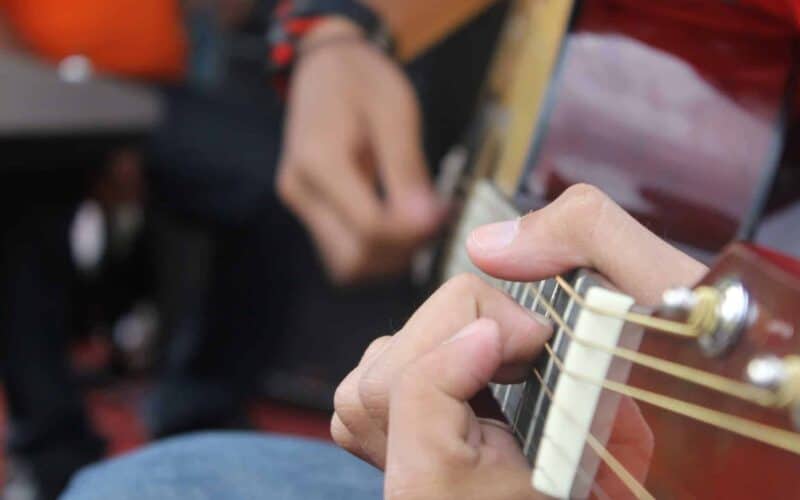Learning to play the guitar can be an incredibly rewarding journey, but it requires patience, dedication, and the right guidance. As a beginner guitarist, it’s crucial to establish a strong foundation by understanding the fundamentals of your instrument and developing effective practice habits.
This article presents 20 practical guitar tips for beginners to help you navigate the early stages of your guitar-playing journey, from choosing the right guitar to mastering essential techniques.
Understanding Your Guitar
Making an informed choice when buying your first guitar and familiarizing yourself with its components and functionalities are crucial for beginner guitarists to set a strong foundation.
1. Choosing the Right Guitar: Acoustic vs. Electric
When buying your first guitar, it’s essential to choose a guitar that feels comfortable to play and has a sound that inspires you.
Acoustic guitars are versatile and great for beginners who want to learn chords and strumming techniques. They are also portable and do not require additional equipment, making them a convenient option for beginners.
Electric guitars, on the other hand, offer a wide range of sounds and styles, making them ideal for beginners interested in rock, blues, or jazz music. However, they require additional equipment, such as an amplifier and cables, which can add to the cost.
Ultimately, the type of guitar you choose should align with your personal preferences and musical goals. By making an informed decision, you’ll set yourself up for a positive and enjoyable learning experience.
2. Know Your Guitar
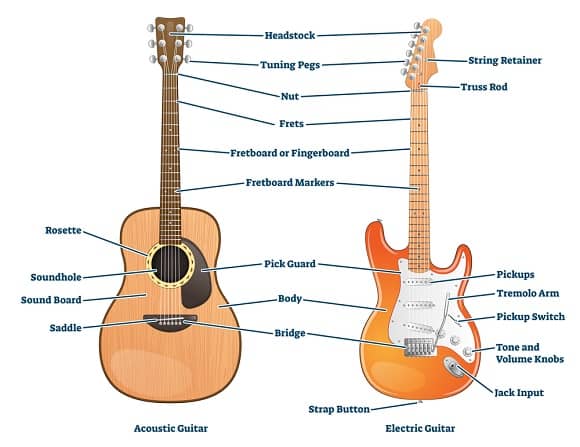
To become a proficient guitarist, it’s essential to familiarize yourself with the different parts of your guitar, their functions, and how to maintain them. This knowledge will help you better understand your instrument and troubleshoot any issues that may arise.
In my personal experience, I’ve found that having a basic understanding of guitar anatomy has helped me communicate more effectively with technicians and other musicians. It’s also given me the confidence to make adjustments and modifications to my guitar, further enhancing its sound and playability.
Learning Fundamentals
Mastering the fundamentals of guitar playing is essential for beginners to build a strong musical foundation. This section will cover key tips to help you develop essential skills and techniques that are crucial for your growth as a guitarist.
3. Play and Practice with a Tuned Guitar
Playing with a tuned guitar is crucial for developing a good ear for pitch and avoiding the practice of incorrect intonation.
As the legendary Bob Dylan said,
“My biggest fear was that my guitar would go out of tune”
To tune your guitar, you can use an electronic tuner or a tuning app, or you can learn how to tune by ear to standard guitar tuning. Practicing with an out-of-tune instrument can hinder your progress and lead to bad habits, so it’s essential to ensure that your guitar is in tune before every practice session.
4. Focus on Perfecting the Basics
I know how monotonous the basics of a guitar are! You are stuck practicing chords and fingering whereas your main intention behind learning the guitar was to sing songs. But, you are wrong if you think that this procedure is useless.
These basic practices help your fingers become more flexible and your finger placement become more accurate. As a result, it becomes your gradual but solid road to playing better!
5. Learn Your DO-RE-MI
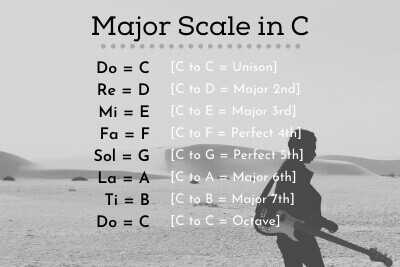
One important thing that beginner musicians, in general, should understand is that music is just composed of these 7 notes within what you call a scale. The next note would then indicate one pitch higher as in C-D-E-F-G-A-B-C.
That’s just the equivalent of DO-RE-MI-FA-SO-LA-TI-DO. Know that your chords are just composed of notes rung together to form a harmonious sound and then chords played one after the other form a melody creating music or a song.
Check here for a useful guide for beginners to learn guitar scales using Do-Re-Mi.
6. Learn to Transform Chord Diagrams into Music
Another thing you will come across every day in your guitar life is the chord diagram. It tells you where to place your finger on a particular chord. They contain a picture of each of the six strings and make it easier for you to read your music.
Practice placing your fingers on the correct frets and strings as indicated in the diagram. Additionally, practice transitioning between chords smoothly and efficiently. This skill is crucial for playing songs and requires consistent practice to master.
By learning to transform chord diagrams into music, you’ll be able to play a variety of songs and progress to more complex chord progressions and techniques.
7. Stick to Simple Chord Progressions Earlier on
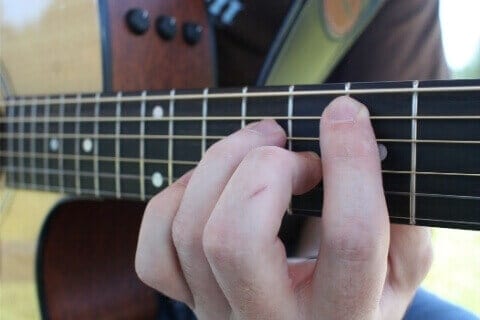
Songs with 2 to 4 guitar chords involved in its progression are great ones to start practicing with. Songs with four-chord progressions are probably best. You’ll get to practice changing from one chord to another more seamlessly plus there are several songs out there to choose from.
Plus, you get to learn about the relationships between minor and major chords early on without even knowing it. Chord progressions like D-A-Bm-G or G-Em-C-D are quite commonly used in songs albeit with different rhythms and tempos.
Once you’ve nailed down the fundamentals you’ll understand why these progressions are commonly used and how you can apply them through the varying notes, chords, or scales along your entire fretboard.
Tips for Improving Technique
Enhancing your technique is a key aspect of becoming a proficient guitarist. Check some valuable tips to help you improve your guitar technique and play with greater precision and control.
8. Learn Guitar Tabs
Guitar tabs, or tablature, are a simplified form of musical notation that provides a visual representation of the guitar fretboard, indicating where to place your fingers to play a particular riff or chord. Tabs are especially useful for those who may find traditional sheet music challenging to interpret.
As the greatest Austrian composer Franz Schubert once said,
“The guitar is a wonderful instrument which is understood by few”
To get started, learn how to read tabs and familiarize yourself with their notation. You can find tabs for various songs and techniques online or in guitar books.
9. Practice Using a Metronome
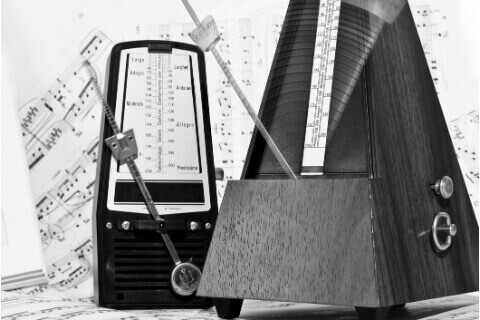
A metronome is a cheap device or nowadays an application on your smartphone that makes a click sound continuously and can be pre-set on varying tempos or speeds to use as a guide as you exercise your harmonic progressions.
A metronome teaches you or should we say trains your body and gives it rhythm. Little by little, as you exercise with a metronome your playing style will be a lot cleaner as you won’t spill your chord or harmonic progressions over the next iteration.
This is a valuable skill you’ll need later on once you start recording your own music.
10. Practicing While Standing
As a guitarist, you’ll often need to play while standing, whether for performances or jam sessions. To get comfortable playing in this position, practice standing up during your practice sessions.
Start by setting up your guitar at the correct height and angle for comfortable playing. Remember to maintain proper posture and technique while standing, and use a strap to keep your guitar securely in place.
With consistent practice, you’ll be able to play with ease and confidence, no matter the setting.
11. Arch Your Fingers Properly
Maintain a curved hand position with your fingers arched over the strings. This enables better control and dexterity, especially for fingerstyle playing.
Proper finger posture is an essential beginner guitar tip that lays the foundation for developing good technique. Take your time to master this fundamental aspect of how to play the guitar.
Tips for Efficient Practice
Dedicated practice is key to improving your guitar skills. Let’s explore some tips and tricks to make the most of your practice sessions.
12. Practice Efficiently
Dedicate specific time slots for focused practice, rather than sporadic playing. Break down complex techniques into smaller, manageable steps.
Consistent, structured practice is more effective than occasional lengthy sessions. Patience and persistence are key to steady progress in guitar learning.
If you’re curious about how to optimize your practice time for maximum progress, check out our article on “How much should I practice guitar.”
13. Go Slow
When learning new techniques or songs, start at a slow tempo and gradually increase the speed.
As the renowned Irish blues-rock guitarist Gary Moore said,
“How can you learn to play lots of fast notes when you can’t make a few slow ones sound good?”
This allows your muscles and brain to properly internalize the movements. Going slow is an essential guitar learning tip, as it builds the foundation for playing accurately and fluently at higher speeds.
14. Silent Rehearsing
You might find it very difficult to choose between your favorite TV show and guitar training. With silent rehearsing, you can do both! You can keep on practicing the chords with your left hand without using your right to produce the music.
As a result, you get to kill two birds with one stone by merging recreation and training in one slot of your schedule.
For silent rehearsing, you can use a silent guitar like the Yamaha Slg200 or check out our guide on quiet guitar practice for more options.
15. Record Yourself
Recording your guitar practice sessions can be a valuable self-assessment tool. Listening back allows you to identify areas for improvement and track your progress over time.
Reviewing your recordings can provide insights to refine your technique and musicality. This is an effective tip for any beginner guitarist looking to improve their skills.
Tips on Mindset and Approach
Maintaining the right mindset can greatly influence your guitar learning journey. Let’s explore some tips that can shape your approach to picking up the guitar.
16. Do Not Run from Difficult Chords
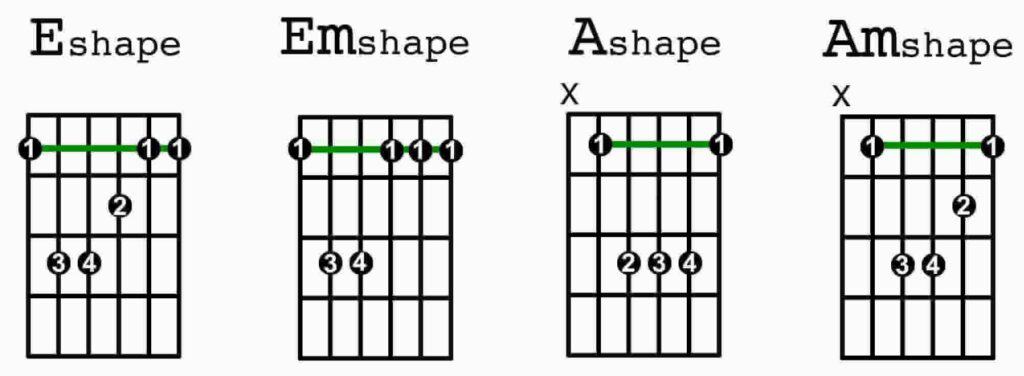
Sometimes you realize how difficult a song actually is once you start practicing and end up leaving it for good. This is something you definitely should not do. Do not be a pessimist, keep trying and you will excel at your work.
Some difficult guitar chords i.e., barre chords are what make the easy chords easier and the most difficult chords, less difficult. Keep on working on the difficult chords and you may find a time when you find no chords difficult!
17. Have Patience and Do Not Quit
Learning to play the guitar takes time and consistent effort. Avoid getting discouraged by slow progress. Keep in mind that all guitar players have faced these when they were absolutely new to the guitar.
As Spanish virtuoso guitarist Andres Segovia said,
“The guitar is the easiest instrument to play and the hardest to play well”
So, do not quit but stay committed to your guitar learning journey, even when faced with challenges or setbacks.
18. Explore!
You must explore different guitar playing techniques, strumming patterns, styles, music theory, etc. as well as listen to a wide range of music. And, never stop yourself from trying out your own techniques! This will help you find your own style and forte.
Tips on Collaborative Playing
Engaging in collaborative music-making can help you develop musicality, timing, and social skills. Let’s look at some tips for incorporating collaborative playing into your guitar learning journey.
19. Play with Other Musicians
Collaborating with other guitar players or musicians can greatly enhance your skills. Performing together helps develop timing, listening, and improvisation abilities.
As pianist William Westney said,
“The most crucial ingredient by far for success in music is…what happens in the practice room.”
Engaging in group practice and performances provides valuable real-world experience.
20. Find a Guide
Consider taking guitar lessons or joining a guitar course. An experienced instructor can provide personalized feedback, identify areas for improvement, and suggest effective practice techniques.
Having a knowledgeable guide can significantly accelerate your progress, especially for beginners picking up the guitar for the first time.
About the Author
Gustavo is a music teacher and classical guitar player from Brazil, currently residing in Dublin, Ireland. He holds a graduate degree in Classical Guitar Performance from the Federal University of Pelotas. In 2020, Gustavo successfully completed a Master's degree in Sound Engineering from the Academy of Sound in Ireland.

